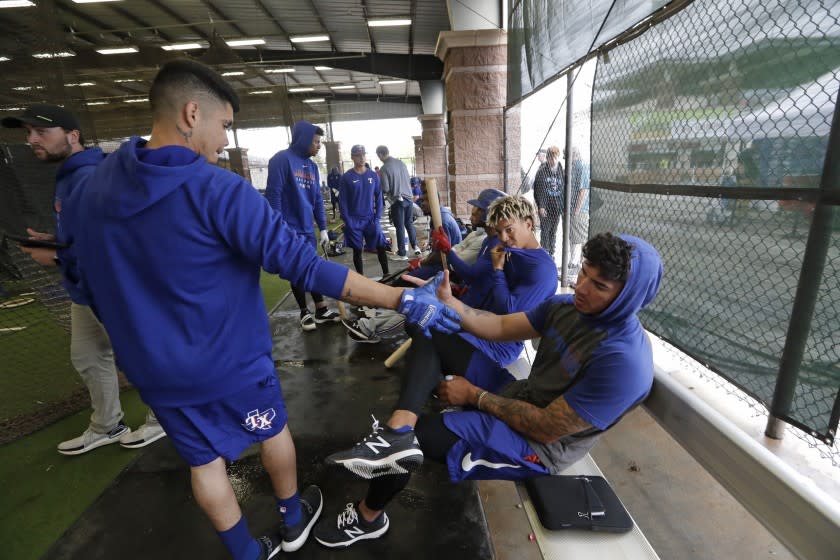Minor league players' advocacy group launches, calls for livable wages

The romance of minor league baseball is not just a selling point for movies like “Bull Durham.” To the men who play professionally below the major league level, it is a talking point for the teams that employ them.
“You’re living your dream, or whatever narrative is being told to you,” said Matt Paré, a former minor league player. “No, you’re a grown man making below minimum wage. For me, that’s an issue.”
As a player, Paré made the “Homeless Minor Leaguer” channel on YouTube. On Friday, he helped launch “Advocates for Minor Leaguers,” with a mission to provide those players with a collective voice and a vehicle for responding to cries that they should remain quiet and appreciate their opportunity to play.
Minor Leaguers,
We formed @MiLBAdvocates to provide you with a collective voice.
It's confidential and free to join 👇https://t.co/YEtsiqHxCm pic.twitter.com/qF1NSShUFb— Matt Paré (@HipHip_Pare) March 20, 2020
“Minor leaguers have been systematically silenced for decades,” said Ty Kelly, who played 11 seasons in the minors and parts of three seasons in the majors.
The group’s first campaign: “Fight for $15,000,” an echo of the “Fight for $15” battles waged across America for an increased hourly minimum wage. With a guaranteed $15,000 annual wage, each minor leaguer would make approximately the same as a full-time worker that earns the current federal minimum wage of $7.25 per hour for a full year.
Times are perilous for minor leaguers with baseball shut down indefinitely because of the coronavirus outbreak. Major league players, who are represented by a union, receive a $1,100 per week stipend while the league negotiates over how salaries should be determined during the hiatus.
Minor league players, with no union representing them, must wait to see what major league owners might decide to pay them. On Thursday, MLB said it would pay a lump-sum stipend to minor leaguers — valued at $400 per week — to cover the balance of spring training, while working on “an industry-wide plan for minor league player compensation” until play resumes.
In the meantime, minor leaguers needing financial help have turned to Twitter accounts and GoFundMe pages.
“Hopefully, in the future, there won’t be a need for a GoFundMe campaign just so a guy can pay for diapers for his kid,” said Garrett Broshuis, an attorney representing a group of minor leaguers suing MLB over alleged violations of minimum wage laws, and a former minor leaguer himself.
Broshuis, a co-founder of the advocacy group, said the issues extend beyond the current crisis. He talked of six minor leaguers renting a two-bedroom apartment and sleeping on air mattresses. Paré talked of the minor leaguers who pooled their meal money to buy a package of frozen chicken at Walmart and cook it on an electric stove in a hotel room.
“There’s no reason,” Broshuis said, “why players should be making below poverty wages in an industry with $10.7 billion in revenue.”
According to Baseball America, fewer than one in five drafted players makes it to the major leagues, where the minimum annual salary is $563,500 and the average salary is approximately $4 million.
When MLB proposed the elimination of 42 minor league teams — and about 1,000 player jobs — starting in 2021, Broshuis said, the league pitched the benefit of increased salaries for the remaining minor league players. Yet, the announced salaries next season start at $4,800 per year.
“It showed more than ever that there needs to be a group out there providing a voice for players and representing their interests,” Broshuis said. “Right now, they’re just getting left behind.”
Broshuis called the advocacy group an “interim” action that could provide immediate support, with players encouraged to join confidentially. But MLB is under no obligation to deal with the group, as it would be if the players had unionized.
“Maybe this is the moment that helps galvanize that type of effort,” he said.
The union that represents major league players has offered support to minor leaguers but has resisted overtures to represent them. The United Steelworkers have received “dozens” of calls about the possibility of unionizing the minor leaguers.
The minor league players are easily replaceable, and ones that might organize a union drive could face retaliation. But those players also see the likelihood of a union in the NBA’s minor league, the G League, and the existence of a hockey union that has negotiated a minimum annual salary of $47,500 for the top minor league in that sport. In triple-A, the minimum annual salary next year would be $14,000.
Andrew Church, a pitcher in the New York Mets’ system, said it was time for the minor leaguers to assert their rights.
“For too long, we as athletes have had our passion for the game exploited,” he said.
Church, the only active minor leaguer on Friday’s conference call announcing the launch of the advocacy group, said it would give players somewhere to go to voice their concerns. He said he is not concerned about a potential backlash from the Mets.
“I would hope I wouldn’t need to be concerned," he said. "These are basic working rights. I don’t think it’s something I should be concerned about.”
Church told the story of a minor league teammate, an all-star at a low level, who had chased the major league dream his whole life. But the player’s father died, and financial support from his family was no longer available.
“He had to quit baseball because he couldn’t afford it,” Church said. “I don’t want that to happen to anyone else.”

